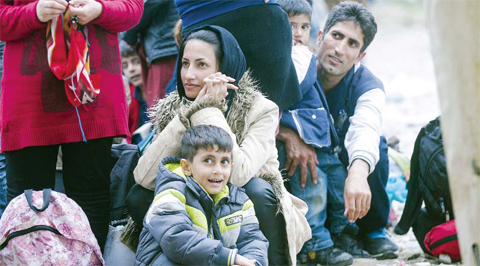 People sit on the ground as they wait with other migrants and refugees to enter a registration camp after crossing the Greece-Macedonia border near Gevgelija yesterday. A surge of 10,000 migrants crossed from Macedonia into Serbia overnight on October 18 to 19 and headed for the Croatian border, where 3,000 had gathered by October 19 morning, said Mirjana Ivanovic Milenkovski with the UN refugee agency in Serbia. — AFP
People sit on the ground as they wait with other migrants and refugees to enter a registration camp after crossing the Greece-Macedonia border near Gevgelija yesterday. A surge of 10,000 migrants crossed from Macedonia into Serbia overnight on October 18 to 19 and headed for the Croatian border, where 3,000 had gathered by October 19 morning, said Mirjana Ivanovic Milenkovski with the UN refugee agency in Serbia. — AFP
BRUSSELS: Never waste a crisis, the political adage goes. The European Union and Turkey may be doing so right now, failing to build a closer partnership while facing a common challenge in the Syrian refugee crisis.
Instead of bringing the two sides together, the past few weeks have mainly highlighted why the relationship has been troubled for decades. Even if the EU persuades Turkey to keep refugees from spilling into Europe - in exchange for money and political sweeteners - the deep-seated causes of the antagonism will remain.
In recent days, Cyprus has thrown water on rekindled hopes for speeding up Turkey's EU membership bid, and France and Holland stressed the need for stringent conditions before visa-free travel for Turks becomes a reality. An angered Turkish President Recep Tayyip Erdogan responded by accusing the EU of being "not sincere" about bringing Turkey into the European fold. Meanwhile, the two sides are bickering over how much money Turkey should get for helping to keep migrants out of Europe.
The EU sees Turkey as a sieve letting through too many Syrian refugees, while Ankara says Europe is not doing its part in helping Turkey deal with the crisis - and has always shown disdain for Turkey's attempts to get closer to wealthy bloc.
The solution under review: more financial aid for Turkey to keep migrants within its borders; acceleration of EU membership talks; and concessions on liberalized visa requirements. All of that would give President Recep Tayyip Erdogan a boost ahead of the Nov. 1 elections.
Harsh words
The outcome so far: angry words, hurt feelings and accusations of political extortion. On Monday, on the heels of a visit from Chancellor Angela Merkel of Germany - where World War II references still touch a nerve - Turkey's Prime Minister Ahmet Davutoglu said "no one should expect Turkey to turn into a concentration camp where all of the refugees are kept."
The harsh words are an indication the size of the challenges ahead. "This is going to be very, very difficult to bridge in practice," said Ian Lesser of the German Marshall Fund think tank. "Yes, there is a lack of trust. But there is also a gap on policies."
And tensions had already been driving both sides asunder over the past months and even years, with the EU ever more critical of Erdogan, increasingly viewed as a repressive autocrat. Even as relations soured, Erdogan has been able to bolster Turkey's national pride, economic clout and strategic importance. The country no longer has much reason to be subservient to a troubled economic power like the EU.
A glance at a map of the region drives home Turkey's vital strategic importance as a bridge to Asia, and the volatile Middle East - making it a key EU partner by force of geography alone. The conundrum is that Europe knows that it needs Turkey, but can't seem to find a way to make the relationship work, especially with an increasingly assertive Erdogan.
Key diplomatic broker
Three decades ago, when Turkey first made its EU membership request, the situation was starkly different. Turkey was economically weak, and the main thing it was known for bringing to the EU was "gastarbeiter" - guest workers doing the menial jobs that fueled industry in Germany and other western European nations.
The membership request was mostly met with derision then. Things started to change as Turkey, under Erdogan, became one of the world's hottest emerging economies and a key diplomatic broker with the Middle East. But even today, the thought of a mainly-Muslim nation of 78 million joining a mostly Christian club of over 500 million is met with great resistance in Europe - especially due to the hostility spawned by Islamic extremism.
"Unfortunately," said Lesser, "for political reasons we can understand, (Islam) has become part of the debate." Since Turkey was accepted as a candidate for membership a decade ago, accession talks have moved at snail's pace, overshadowed by the 1974 Turkish invasion of Cyprus after a Greek junta-backed coup aiming to unite the island with Greece. The Greek part of Cyprus is an EU member now. As recently as Monday, Cyprus insisted that Turkey should not harbor too many hopes for membership.
Greece and France have also slammed the brakes at various times. "At the end of the day, the position of the majority of the member states is that they don't want Turkey as a member," said Amanda Paul, an analyst with the European Policy Center.
Yet as the refugee crisis continues unabated, EU countries want to "re-energize" the membership debate as a carrot for Turkish help. When German Chancellor Angela Merkel traveled to Istanbul on Sunday - two weeks before the Turkish elections - those hopes briefly flared again. The reasoning goes that when Merkel smiles at Turkey, the rest of Europe will follow suit.
Overall, however, skepticism continues to rule. "It is a fantasy to think that refugees will stay in Turkey because we speed up accession negotiations and give 3 billion euros to Erdogan," said EU liberal leader Guy Verhofstadt. - AP
.jpg)



